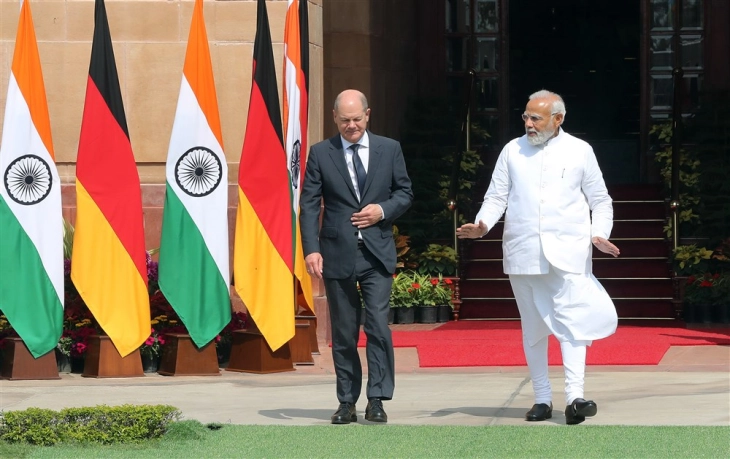Scholz in India to strengthen ties, talk Russia
- German Chancellor Olaf Scholz has arrived in India for a two-day visit. He was received with military honours by Prime Minister Narendra Modi in the capital New Delhi on Saturday morning.

New Delhi, 25 February 2023 (dpa/MIA) - German Chancellor Olaf Scholz has arrived in India for a two-day visit. He was received with military honours by Prime Minister Narendra Modi in the capital New Delhi on Saturday morning.
Modi is chairing the Group of 20 (G20) leading economic powers this year.
"We have already very good relations between India and Germany. And I hope that we would strengthen these very good relations and that we will discuss intensely about all the topics relevant for the development of our countries but also for peace in the world, which is important," Scholz said.
Among the main issues to be discussed during the German chancellor's visit will be Russia's war against Ukraine, on which India has taken a neutral stance.
Modi said he wants to help with peace efforts in the Ukraine war. "India is ready to contribute to any peace efforts," Modi said later after a meeting with Scholz. Modi also stressed that India had been calling for a resolution of the crisis through dialogue and diplomacy since the war began.
India did not agree to the resolution calling for Russia's withdrawal from Ukraine at the UN General Assembly on Thursday but abstained.
Scholz wants to expand economic and strategic relations with India - to reduce Germany's dependencies on China, but also to free India from its close ties to Russia.
On his first visit to the subcontinent as chancellor, however, he does not want to come across as lecturing.
Scholz prepared his trip last weekend in his speech at the Munich Security Conference with a quote from Indian Foreign Minister Subrahmanyam Jaishankar, which he made his own: "Europe has to grow out of the mindset that Europe's problems are the world's problems, but the world's problems are not Europe's problems." This went down very well with Indian media.
In an interview with the Times of India shortly before his trip, Scholz also avoided criticism of India's Russia policy and emphasized the common ground. "Together we stand for state sovereignty peaceful conflict resolution worldwide. We stand firmly behind the message that neo-imperialism will not prevail - something history has shown many times," he said.
India is not only working closely with Russia economically. Since the start of full-scale Russian invasion of Ukraine a year ago, it has expanded its imports of relatively cheap Russian oil.
Critics accuse the country of undermining Western sanctions. The German government does not want to turn this into a problem for bilateral relations. "It would be wrong for us to see this as a provocation," government sources said.
In view of the size of India with its 1.4 billion inhabitants and the challenges facing the country, it is "not unreasonable behaviour in purely market terms" on the part of India.
Militarily, India is also very close to Russia. Much of the equipment of the Indian armed forces comes from there. "That this remains so cannot be in our interest," German government sources said. Cooperation in the field of armaments will therefore play "an important role" during the trip. There are already "some interesting projects," especially in the maritime sector.
According to Indian media reports, the government in New Delhi is looking for a cooperation partner for the production of six submarines. Germany's ThyssenKrupp Marine Systems could be considered, but South Korea is also said to be in the running. Such a deal would be worth several billion euros.
India currently has 16 conventional and one nuclear submarine. The country is one of a presumed total of nine countries that possess nuclear weapons and has been in conflict with its neighbour Pakistan, which also has nuclear weapons, for decades. Arms exports to India are therefore controversial.
Scholz is accompanied on the trip by a dozen business representatives. There are already 1,800 German companies operating in India.
Among other things, Scholz plans to visit a location of the German software company SAP in the high-tech metropolis Bengaluru - the South Indian Silicon Valley - on Sunday.
Scholz sees potential for increased cooperation with India above all in renewable energies, hydrogen, mobility, the pharmaceutical industry and the digital economy.
Action on climate change is also to play an important role in the trip. "Without key countries like India, we won’t be able to limit the global temperature rise enough to keep the 1.5-degree-Celsius goal of the Paris Agreement in reach and achieve green transformation," Scholz told the Times of India.
India is the third largest producer of climate-damaging greenhouse gases after China and the United States, but lags behind in climate action. The analysis portal Climate Action Tracker, for example, rates India's plans in the fight against global warming as "highly inadequate."
Photo EPA







